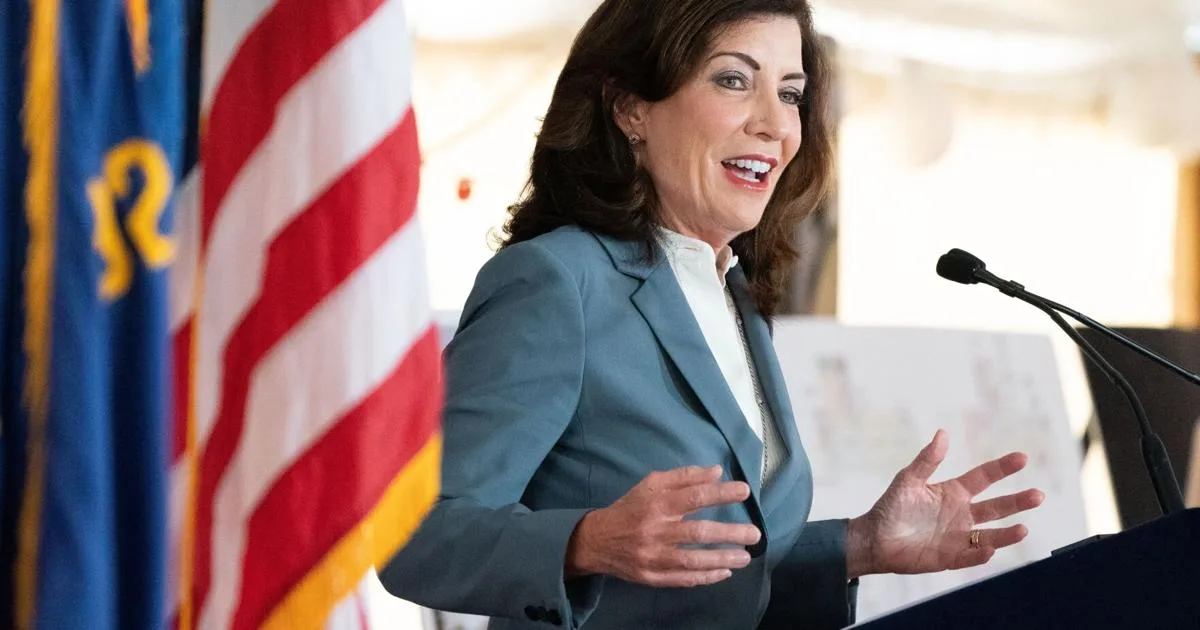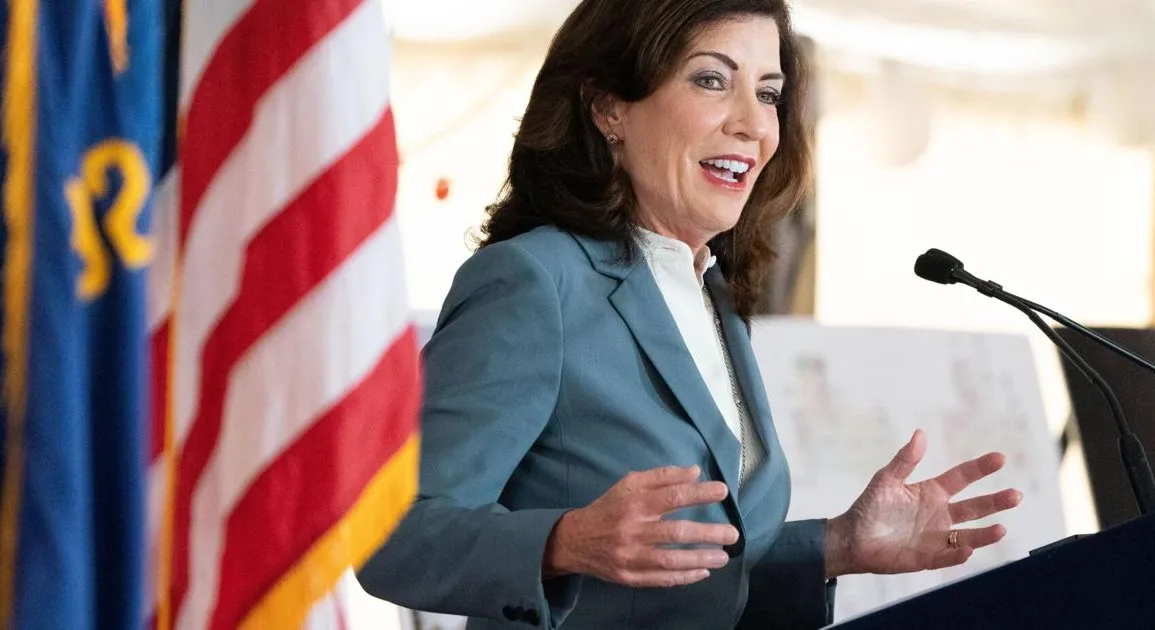
Before the clock strikes midnight on 2023, Gov. Kathy Hochul must still decide whether to sign or veto more than 100 bills passed by the Democratic-controlled State Legislature this year.
Governors have historically left decisions on some of the most contentious bills close to the holiday season, a time when the public is paying less attention. Here are a few of the biggest bills remaining on Hochul’s plate.
Noncompete ban
In the waning hours of the 2023 state legislative session, Albany lawmakers are passing bills upending local elections, rolling back a campaign finance reform, sealing criminal convictions and much more. Here’s the latest.
Buffalo State Sen. Sean Ryan is the sponsor of a bill that would bar employers in New York from using noncompete agreements, which limit workers’ abilities to leave for another job. The agreements typically bar employees from working for a competitor for a certain period after leaving a job.
Ryan said more than 40% of the employers in New York use noncompete agreements, ranging from small engineering companies, to fast- food chains, to car rental shops, to health care providers.
People are also reading…
“Most workers sign a piece without even realizing it,” Ryan said. “The worker is left with only bad decisions. You can pack up, move to a different geographic area. You can find a brand-new job in a brand-new field. Or you can just stay with the current employer.”
At a late November news conference, advocates for the bill said Hochul’s staff had been declining to meet and hear their arguments – a development that Paul Sonn, state policy program director at the National Employment Law Project, called “highly unusual.”
Business groups, including the State Business Council, Partnership for New York City, and Wall Street firms such as Goldman Sachs, have lobbied against the bill, arguing that noncompete agreements help keep employees from leaving for competitors with sensitive company information, and that the bill could force businesses to move out of state. The funders of a significant campaign against the bill – through the Business Council’s nonprofit arm – have not been publicly disclosed.
Hochul recently told reporters that she’s looking to strike a compromise with bill sponsors, which would still allow noncompete agreements for workers above a certain income threshold.
“I’m not so worried about the very wealthy, well taken care of Wall Street, hedge fund, finance, top paid lawyers – they can take care of themselves,” Hochul said. “So I have to strike the balance to make sure we take care of lower and middle-income workers, up to say $250,000.”
Grieving Families Act
Almost a year ago, Hochul vetoed the Grieving Families Act, a bill that would allow relatives of people who died because of reported negligence to sue for “emotional damages.”
Proponents say current law – which allows lawsuits for economic losses, but not emotional ones – discounts the deaths of lower-income people. Opponents say the proposal in New York is broader than laws passed in other states, and would significantly raise costs for the health care, small business and government sectors.
Before issuing her veto, Hochul had offered an amended version that would have only allowed such lawsuits to apply to the deaths of people under 18 years old. That would have excluded families of the 10 people killed in the racist mass shooting at Tops Markets on Jefferson Avenue last year, all of whom were adults. Hochul also sought a broad amendment to exclude medical malpractice claims. The Democratic-controlled Legislature balked at the amendments, and Hochul issued the veto.
This year, the Legislature returned with an amended version that sought to address concerns by further limiting which family members are allowed to sue. The amended bill would still apply, however, to wrongful death victims of all ages and medical malpractice claims, despite Hochul’s previous objections to those sections.
The bill stoked a battle between two of Albany’s most prominent interest groups: Trial lawyers, who strongly favor the bill, and groups representing hospitals, which strongly oppose it.
Campaign finance rollback
By year’s end, Hochul must decide whether to sign a bill undercutting key aspects of a program meant to reduce the influence of major donors in state elections.
A new publicly funded system for state elections – created through a 2020 state law – is taking effect ahead of the 2024 elections. But Democratic leaders in the Legislature, after considering defunding the program, instead pushed a rollback through the Legislature in June.
Some Democratic lawmakers fear that unless changes are made, the new system would leave them more vulnerable to primaries from Democrats or to general election challenges from Republicans.
As the law stands, only campaign donations of $250 or less would be matched with generous amounts of public funds – a provision meant to elevate the importance of small donations to candidates.
But the bill on Hochul’s desk removes that $250 cap, so that the first $250 of a donation of any size – up to the maximum amount for a given office – is matched with public funds. For instance, a statewide candidate for office could receive a maximum $18,000 donation, then see the first $250 matched, diminishing the incentive for candidates to rely on small donors.
The new bill also significantly raises the number of in-district donors and the total donation figure needed to qualify for public matching funds – likely making it more difficult for incumbents’ opponents to qualify. Proponents of the change, however, argue “unserious” candidates for office should not be able to qualify for hundreds of thousands in taxpayer funds.
Election-year shift
Hochul must decide whether to sign a bill that would move many local elections in New York to even-numbered years.
The bill would mean many important local elections in Erie County – including for Erie County Legislature and Erie County executive – would be in even years, beginning in 2026.
Under the bill, local officials elected to two-year terms in 2025 would only serve one year before running again; officials elected to four-year terms in 2025 would serve three-year terms.
The bill would not apply to positions where the terms are set under the state constitution, including judges, district attorneys and county clerks. City elections, including in Buffalo, would also continue to be in odd years.
If signed into law by Hochul, the bill could well advantage Democrats in local elections, since turnout is typically higher in even years, when races for governor, Congress and U.S. president are at the top of the ballot. Higher turnout usually benefits Democratic candidates.
Republicans argue the change would not save money, since elections will still have to be held on odd-numbered years for certain offices. Leadership of the New York State Association of Counties has also expressed opposition, arguing that local issues will be drowned out with national contests on the top of the ticket.
Democrats in the Legislature argue that greater turnout in local elections would be beneficial. And the Democratic sponsor of the bill, Sen. James Skoufis, also wants to pass a constitutional amendment to have all elections in even years – a change that would help local governments save money on holding elections.
Reparations commission
Hochul must decide whether to sign a bill creating a nine-person commission to examine the impact of slavery and discrimination in New York and suggest potential reparations.
The commission’s recommendations, issued in a report, would be nonbinding; decisions about any payments, including by the state government, would ultimately be made by state lawmakers.
A similar commission in California issued recommendations in June. The most controversial has been the idea of cash payments for the descendants of enslaved African Americans in California, but there were other proposals, as well, including suggested reforms to the criminal justice system. State lawmakers there will ultimately decide whether to adopt such policies.
Hunting contest ban
Buffalo State Sen. Tim Kennedy is the Senate sponsor of a bill banning many types of wildlife hunting contests in New York.
The legislation would bar contests in which participants compete for cash and prizes for killing the most, heaviest or largest animals within a certain period, such as coyotes, foxes, bobcats, rabbits, crows, woodchucks and squirrels. Kennedy’s bill memo call the contests a “wanton waste of New York’s wildlife resources.” The bill does not apply to contests for hunting white-tailed deer, turkey, bear, or fishing.



